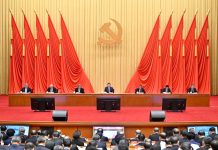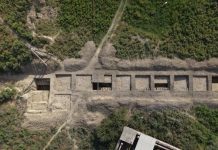BEIJING: In a single domesticated grain seed, one might see the bud of great civilizations.
The birth of agriculture was a turning point in humans’ social development, as stable food supplies enabled people to transcend the constraints of food gained by hunting and gathering. After that, people were able to settle down and experience population booms.
As one of the major areas around the globe where agriculture originated, China has contributed to the world’s domesticated rice, millet, buckwheat and soybeans.
Archaeological studies have unveiled that the planting of rice originated around 10,000 years ago in the lower reaches of the Yangtze River, leading to the eventual replacement there of hunting and gathering practices dating back 5,000 to 6,000 years.
“It marked the formation of a rice-based agricultural society in the area,” said Zhao Zhijun, an archaeologist at the Chinese Academy of Social Sciences.
Archaeological studies of the origins of rice-based agriculture are an important part of a national project tracing the origins of Chinese civilization itself.
President Xi Jinping has greatly valued the project.
At a group study session of the Political Bureau of the Communist Party of China Central Committee on May 27, 2022, Xi, who is also general secretary of the CPC Central Committee, emphasized the significance of the project and the role that archaeological studies play in better understanding Chinese civilization.
The project to trace the origins of Chinese civilization, in addition to finding signs of human activity more than 1 million years ago, has also proved that China’s history includes 10,000 years of culture and more than 5,000 years of civilization.
The project has provided clear knowledge of the origins and formation of Chinese civilization, the history of its development, the process of the formation and development of its pluralistic and integrated pattern, and the characteristics of the civilization and why it was formed in such a way, he added.
This was not the first time that Xi emphasized the importance of the origin-tracing project. Since the 18th National Congress of the CPC in 2012, Xi has visited more than 100 historical and cultural locations and issued many instructions related to archaeology and the origin-tracing project.
During the 23rd group study session of the Political Bureau of the CPC Central Committee in 2020, Xi called for giving more attention to archaeological research and letting historical facts speak for themselves.
“This will provide strong support for our efforts to carry forward the best of traditional Chinese culture and increase our cultural confidence,” said Xi.
The origin-tracing project has been carried out since 2002. Its ongoing fifth phase, which started in 2020, involves the participation of more than 500 researchers from 29 institutes across the country. –The Daily Mail-China Daily news exchange item






